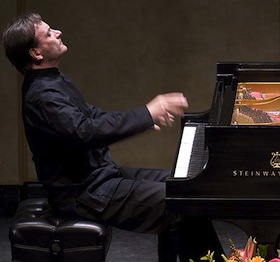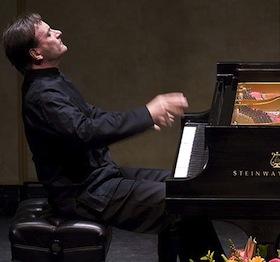
“Sonata” is likely the most common title of the classical repertoire. Although it originally referred to compositions that are played, as opposed to sung (the Italian word means “sounded, played”), it evolved through the classical period to establish a formal organization.
On Sunday afternoon at the Lesher Center for the Arts, Stephen Hough took us on a journey through what he called “strange” sonatas that departed from the traditional form.
He began with perhaps the best-known piano sonata of all: Beethoven’s Sonata Op. 27, No. 2, titled “Sonata Quasi Fantasia” but better known as the “Moonlight Sonata.” The well-known title was given by the publisher, interested in maximizing the sales, but the soundscape that Hough evoked was indeed a moonlit scene. With a moving tempo, the triplets depicted the gentle ripples of water, with the pronounced left hand representing its dark depths. The clear treble line completed the picture by illustrating the cool, bright moonlight, sometimes obscured by nighttime clouds.
After performing the work, Hough informed the audience that this is a particularly unusual sonata, in that its first movement is not in sonata form at all, but rather is more of an improvisation, thus titled “Sonata Quasi-Fantasia.” After unlocking the mystery of that famous movement, he completed the work with a driving force, with accented left hands in the third movement. The effect from the percussive left hand created a powerful momentum throughout the movement, interrupted only by several breaks written in the score.
Powerful Ecstasy
That driving force was pervasive throughout the recital. The one-movement Scriabin Sonata No. 5, Op. 53, seemed a cerebral ecstasy, full of power and vitality. Its sensual lines were shaped with much indulgence, leaving me wanting more. However, given the suggestive instructions by the composer, I felt that the experience was largely left in the cerebral cortex, which plays a key role in awareness and consciousness, rather than in the more primal limbic system, which controls feelings of pleasure and other emotions. The various musical ideas were clearly identified, even though human emotions are often anything but clear.
The titanic Liszt Sonata in B Minor stood alone in the second half of the recital. Hough distinguished himself from other pianists by presenting an unusual level of clarity. Instead of glazing over fast passages, blurring them with the sustain pedal, he approached them from a clinical perspective, largely abolishing use of that pedal. The fugato was stoic in nature, but at the expense of elasticity. Nevertheless, the pulsating driving force was maintained throughout the piece to provide a backbone, giving a convincing argument for a different look and listen at this overplayed piece.The recital’s highlight was the performance of Hough’s own Sonata, called Broken Branches.
The recital’s highlight was the performance of Hough’s own Sonata, called Broken Branches, which he premiered at the Wigmore Hall in London last year. It almost resembles a collection of miniatures, but there is a thematic cohesiveness that binds them all together. The opening Prelude sounded to me like a bitonal work, where the left hand plays in G-sharp minor, with the right hand uncomfortably in G major. It evoked the advance of a cold winter, though the clear lines in the subsequent movements belied a snow scene. Its tonality was reminiscent of some of Messiaen’s work, yet with a tonal center, or perhaps centers, which breathed life into the piece by creating a cycle of tension and relief. To my ears, the broken branches were those blown off by the cold, dry winds of a New England winter, covering a thick layer of dead deciduous leaves. The Postlude, as Hough explained, removes the accidentals of the Prelude, thus creating a harmonious scene that represents a warm spring’s arrival. It was fitting for the little warm sunny break that we enjoyed outside after the recital.
